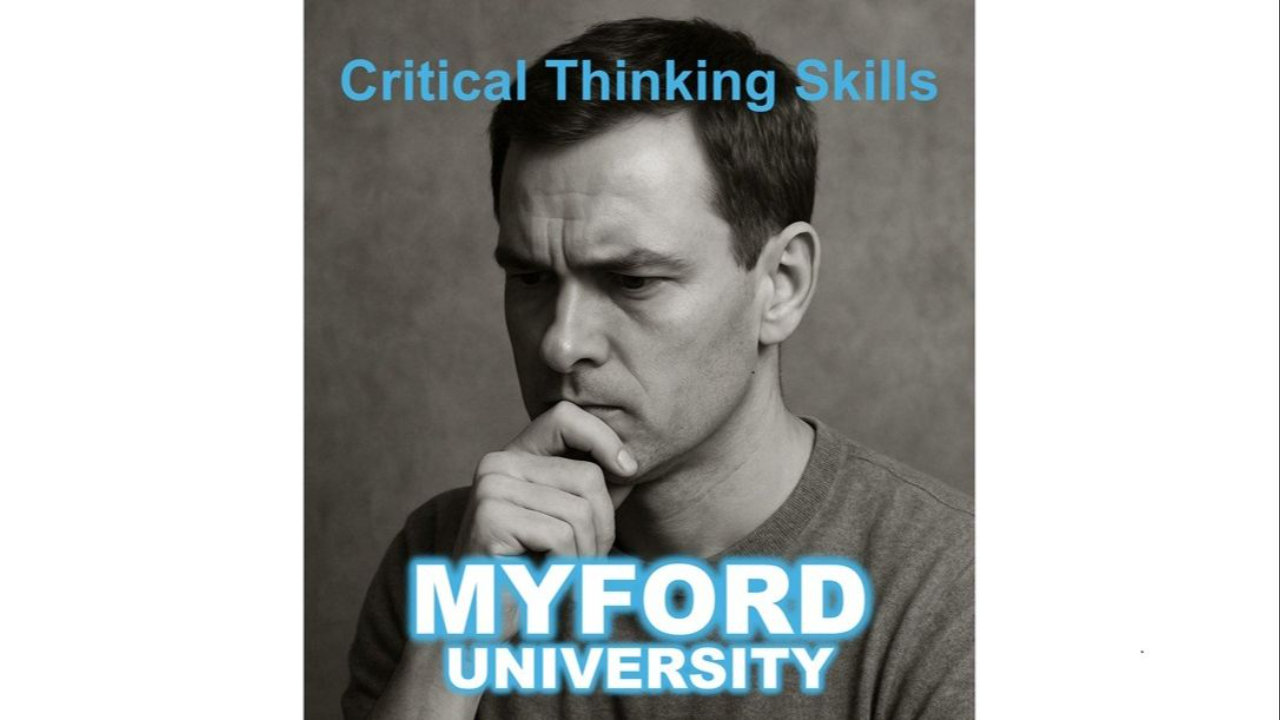Critical Thinking: What It Is, Why It Matters, and How to Actually Use It
Jun 26, 2025
Welcome back, colleagues. I’m George Sloane, Dean of Myford University—the place where we strip out the fluff, simplify the complex, and make learning fast, practical, and real.
Today we’re talking about a concept that gets tossed around a lot but rarely explained well: Critical Thinking.
Professors love to say it’s important. Employers say they want it. Job postings list it as a required skill. But what the hell is it?
Let’s break it down.
What Is Critical Thinking?
Let’s start with a dead-simple definition:
Critical thinking is the ability to think clearly and rationally about what to believe or what to do.
It means asking the right questions, weighing evidence, spotting BS, and making thoughtful, well-informed decisions.
It’s not about being negative or constantly “critiquing” everything.
It’s about being intentional. Objective. Discerning.
In a nutshell, it’s thinking on purpose.
Let’s unpack that further.
Critical thinking includes:
- Observation – What do I see or know for sure?
- Analysis – What are the parts and how do they fit together?
- Evaluation – What’s reliable and what’s not? What matters most?
- Inference – Based on what I know, what conclusions make sense?
- Explanation – Can I clearly describe why I think what I think?
- Self-regulation – Am I checking my own biases and assumptions?
If that sounds academic—it is. But we’re about to bring it down to earth and make it actionable.
Why Critical Thinking Is a Superpower
Let’s be clear: Critical thinking is not optional.
It’s essential.
Whether you’re a business owner, employee, student, parent, tradesperson, or team leader—your ability to think critically is what separates success from struggle.
Here’s why:
- We live in an age of information overload.
Everyone’s got an opinion. Algorithms feed us what we already believe. If you don’t think critically, you’re just a puppet of someone else’s agenda. - Bad decisions are expensive.
Whether it's a poor hire, a bad investment, or staying in a toxic job—critical thinking helps you avoid mistakes you’ll regret. - Problems are more complex.
Today’s problems don’t have multiple choice answers. You need to think through nuance, trade-offs, and second-order consequences. - It makes you trustworthy.
Critical thinkers are who people turn to when stuff hits the fan. Why? Because they stay calm, assess the facts, and don’t jump to conclusions.
Who Needs Critical Thinking?
Short answer: Everyone.
But let’s get specific:
- Leaders and managers – You’re constantly making judgment calls. Critical thinking helps you avoid knee-jerk reactions and lead with clarity.
- Students and self-learners – You’re bombarded with content. Critical thinking helps you tell good signal from noise.
- Entrepreneurs and small business owners – You face uncertainty daily. Critical thinking lets you adapt, pivot, and stay focused.
- Parents – Whether managing your kid’s education or TikTok intake, critical thinking helps you cut through BS and raise better decision-makers.
- Tradespeople and technicians – Don’t let anyone fool you: diagnosing a furnace issue or planning a complex install requires critical thinking.
Where and When Should You Use It?
Anywhere. Anytime. But here are key situations where critical thinking matters most:
- Decision-making – Choosing a job, supplier, contractor, business model, investment, or strategy.
- Problem-solving – When something goes wrong and the root cause (we will get more into Root Cause Analysis in a future post—basically, it revolves around asking, “Why?”) isn’t obvious.
- Evaluating advice – From mentors, managers, gurus, YouTube personalities, or even me—don’t just accept it. Think it through.
- Planning – Setting goals, mapping steps, identifying risks, and making trade-offs.
- Conflict – When emotions run high, critical thinking helps you separate facts from feelings.
- Learning something new – Especially when information conflicts or challenges what you already believe.
How to Think Critically – Step by Step
Here’s where we make it practical. Use this as your go-to process:
- Start with the Question
Instead of rushing to an answer, pause and ask:
- What exactly am I trying to figure out?
- What problem am I really trying to solve?
Get clear on the question, or everything that follows will be off.
Example: “Should I take this job offer?”
Better question: “Does this job move me closer to my long-term goals without compromising my values?”
- Gather the Facts (Not Just Opinions)
Don’t make decisions based on headlines, hot takes, or hunches.
Ask:
- What do I actually know?
- What do I not know?
- What assumptions am I making?
Separate facts, feelings, and assumptions.
- Check the Source
Where did this information come from?
- Is it credible?
- Is it biased?
- Is it complete?
If someone has something to sell you, filter harder.
Pro tip: If everyone on social media agrees, start digging deeper.
- Consider Alternatives
Most people stop at the first “reasonable” answer. Critical thinkers go further.
Ask:
- What are 2 or 3 other ways to look at this?
- What would someone smarter or more experienced than me say?
- What would I advise someone else to do?
This step is where creativity meets logic.
- Weigh the Pros and Cons
What’s the best-case scenario?
What’s the worst-case scenario?
What’s most likely?
Then ask:
“Can I live with the worst-case?”
If yes, and the upside is big enough—move.
- Check Yourself
You’ve got cognitive biases. So do I. So does everyone.
Before you finalize a decision, ask:
- Am I being emotional?
- Am I just confirming what I already wanted to believe?
- Am I afraid of being wrong?
Being self-aware doesn’t mean you’re weak. It means you’re thinking.
- Take Action, Reflect, Iterate
Critical thinking doesn’t mean analysis paralysis.
Think. Decide. Act. Then reflect.
- What worked?
- What didn’t?
- What will I do differently next time?
This is how critical thinking becomes a skill—not just a concept.
Common Pitfalls to Avoid
Here are some ways people think they’re using critical thinking, but they’re not:
- Overconfidence bias – “I know I’m right.” Maybe. Maybe not. Check your ego.
- Echo chambers – Surrounding yourself with people or content that already agrees with you.
- False urgency – Feeling like you have to decide right now. You usually don’t.
- Overcomplication – Making it harder than it is. Sometimes the simplest answer is the best.
Critical Thinking in Real Life: Examples
At work:
A vendor quotes you 20% under budget. Sounds great—until you dig in and realize their scope is half what you expected. Critical thinking saves you from cost overruns and headaches.
In parenting:
Your kid comes home with a wild story about a fight at school. Critical thinking stops you from immediately calling the principal and helps you get the full picture first.
In business:
You're debating whether to expand your services. You could jump in based on gut—but instead, you break down your data, assess risks, test small, and scale only when it works.
What If You Don’t Think You’re a Critical Thinker?
Good news—you can become one.
Critical thinking is a skill, not a personality trait.
It’s developed through habit and repetition.
You don’t need a college degree.
You don’t need permission.
You just need practice.
You should learn critical thinking in college, but why waste the outlandish amounts of time and money?
Here at Myford University, we help you get results now--that’s what we’re about.
Final Takeaway
If you want to level up—in business, relationships, finances, or leadership—critical thinking is non-negotiable.
It’s not about being “smart.”
It’s about thinking clearly.
It’s about asking better questions.
And it’s about owning your decisions.
So don’t let the term intimidate you.
We’ll break it down.
We’ll make it simple.
And you’ll learn to use it—fast.
Welcome to Myford University, where thinking critically isn’t optional—it’s expected.
See you next time.
Stay connected with news and updates!
Join our mailing list to receive the latest news and updates from our team.
Don't worry, your information will not be shared.
We hate SPAM. We will never sell your information, for any reason.

